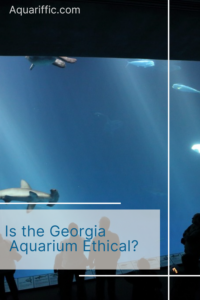Is the Georgia Aquarium Ethical?
As an aquarium enthusiast, the first question that often comes to mind is, “Is the Georgia Aquarium ethical?” Indeed, the ethics of public aquariums, particularly large ones like Georgia Aquarium, are widely debated. With animals in captivity and the issue of wildlife conservation at the heart of the debate, it’s essential to delve into this topic with a critical yet open mind.
Understanding Aquarium Ethics: A Primer
Defining Aquarium Ethics
Aquarium ethics revolve around principles of animal welfare, conservation, education, and science. It questions the morality of keeping marine creatures in captivity and the justifications that aquariums offer for doing so.
Key Issues: Captivity and Welfare
Ethical concerns primarily arise from the captivity and welfare of marine life. Are the creatures well cared for? Is their habitat appropriate and conducive to their natural behavior? Is captivity impacting their lifespan or mental health? These are pertinent questions when assessing an aquarium’s ethical standing.
Exploring Georgia Aquarium: History and Notable Exhibits
About Georgia Aquarium
Opened in 2005, the Georgia Aquarium has quickly established itself as one of the world’s most renowned aquatic institutions. Its breathtaking exhibits, featuring various species, make it a major attraction in Atlanta.
Notable Exhibits: Whale Sharks and Belugas
The aquarium houses numerous species, but most notably, it’s home to whale sharks and belugas, adding significantly to its fame… and controversy.
Analyzing the Ethical Stance of Georgia Aquarium
Conservation and Research Efforts
The Georgia Aquarium advocates for ocean conservation and animal research. They participate in rescue missions and invest in studies aimed at enhancing marine life understanding and preservation.
Educational Programs
Education is at the forefront of their mission. They offer numerous programs and presentations, enlightening visitors about marine life and the importance of conservation.
The Controversies: Is the Georgia Aquarium Ethical?
Concerns about Captive Breeding
Critics argue that the aquarium’s captive breeding programs, particularly concerning belugas, raise ethical issues. Detractors question the impacts of such programs on genetic diversity and animal welfare.
Whale Shark Controversy
The Georgia Aquarium has faced criticism over its whale shark exhibit, particularly the circumstances surrounding their acquisition and the effects of captivity on these large creatures.
The Perspective of Animal Rights Advocacy Groups
Many animal rights organizations express concerns over the welfare of creatures at the Georgia Aquarium, citing captivity’s potential negative impacts on physical and psychological health.
How Georgia Aquarium Addresses Criticisms
The Georgia Aquarium maintains its commitment to high animal welfare standards, conservation, and education. They argue that their programs are crucial for promoting understanding and preserving marine species.
Public Opinion on the Ethics of Georgia Aquarium
Public opinion varies, with some seeing the aquarium as an educational and conservation haven, while others criticize it for animal welfare concerns.
Comparing Georgia Aquarium with Other International Aquariums
Comparing the Georgia Aquarium with other international aquariums offers a broader perspective on how this renowned institution stands in the global context. Here are key points to consider:
- Size and Variety of Exhibits: The Georgia Aquarium is one of the largest in the world and houses thousands of marine species, ranging from small seahorses to massive whale sharks. This is comparable to other significant aquariums such as the S.E.A. Aquarium in Singapore and the Okinawa Churaumi Aquarium in Japan, which also boast large collections of marine life.
- Conservation Efforts: Just like the Monterey Bay Aquarium in California, which is known for its Sea Otter Program and other conservation initiatives, the Georgia Aquarium also emphasizes conservation. They engage in several conservation activities, including animal rescue and rehabilitation, and scientific research aimed at preserving marine species.
- Education and Public Engagement: Similar to the Oceanografic in Valencia, Spain, which puts a strong focus on education, the Georgia Aquarium offers various educational programs and interactive exhibits. They aim to educate visitors about marine life, the importance of conservation, and how human activities affect ocean health.
- Animal Welfare: Like many reputable aquariums worldwide, the Georgia Aquarium maintains high animal welfare standards. They are accredited by the Association of Zoos and Aquariums (AZA), similar to other institutions such as the Shedd Aquarium in Chicago and the National Aquarium in Baltimore.
- Involvement in Breeding Programs: The Georgia Aquarium participates in breeding programs much like the L’Oceanografic in Spain and the Vancouver Aquarium in Canada. However, these programs have been met with criticism and are often at the center of ethical debates.
In summary, while the Georgia Aquarium shares many commonalities with other major aquariums around the globe – from size and variety of marine life to conservation and education efforts – it’s the handling of ethical issues and controversies that often distinguishes it. As an aquarium enthusiast and conscious visitor, it’s crucial to be aware of these differences and make informed choices about which institutions to support.
My Perspective as an Aquarium Enthusiast
From my standpoint, it’s crucial to balance the benefits of education and conservation with the welfare of the marine creatures. It’s a complex issue, and ultimately, transparency is key.
Guidelines for Aquarium Visitation
How to Be Ethical
Visiting an aquarium can be an educational and awe-inspiring experience, but it’s also essential to be mindful of ethical considerations. Below are some guidelines to follow to ensure that your aquarium visit aligns with ethical principles:
- Research the Aquarium: Before visiting, thoroughly research the aquarium. Look into their conservation programs, research initiatives, and how they contribute to the wider scientific community. Are they conducting studies that help marine life? Do they participate in rescue and rehabilitation efforts?
- Animal Welfare Standards: Understand the standards of animal welfare the aquarium upholds. What conditions do the animals live in? Are the habitats similar to their natural environment? How does the aquarium address the mental and physical well-being of the animals? All of this information is often available on the aquarium’s website or through inquiry.
- Source of the Animals: Pay attention to where the aquarium gets their animals. Are they captured from the wild or bred in captivity? Some species are more suited to captivity than others, and ethically minded aquariums often focus on these.
- Educational Programs: Consider the educational value that the aquarium provides. Do they offer informational displays and educational programs that promote conservation and awareness about marine life?
- Visitor Conduct: As a visitor, it’s also your responsibility to be ethical. Follow the rules set by the aquarium, don’t tap on glass or disturb the animals, and make sure to dispose of any waste properly.
Remember, the ultimate goal of visiting an aquarium should not only be for entertainment but also to learn and contribute to the welfare and preservation of marine life.
Conclusion: Navigating the Ethics of Visiting Georgia Aquarium
Is the Georgia Aquarium ethical? There’s no definitive answer. While they make considerable contributions to conservation and education, ethical considerations regarding animal welfare persist. As responsible visitors, it’s our duty to stay informed and make conscious decisions.
FAQs
What is the Georgia Aquarium known for?
The Georgia Aquarium is known for its large exhibits, particularly those featuring whale sharks and belugas.
What ethical issues are associated with aquariums?
Key ethical issues involve animal welfare, captivity, and the impacts of captive breeding programs.
How does the Georgia Aquarium respond to ethical criticisms?
The Georgia Aquarium emphasizes their commitment to high animal welfare standards, conservation, and educational outreach.
Are all aquariums subject to ethical criticism?
Most public aquariums face some degree of ethical criticism, primarily related to animal welfare.
As a visitor, how can I ensure I’m supporting ethical aquariums?
To support ethical aquariums, research their conservation efforts, animal welfare standards, and educational programs before your visit.





